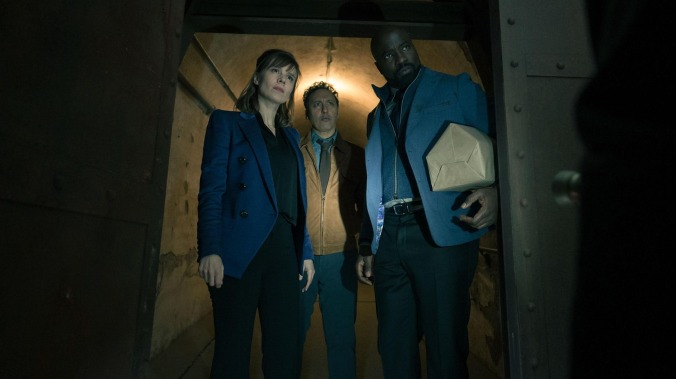Evil season 4 review: A spooky, kooky, rousing farewell
The last gasp of Paramount+'s horror show is one hell of a ride

For a show that repeatedly raises the question “What the fuck is going on here,” Evil is remarkably sure of itself. The best part of this Paramount+ series is its confidence in navigating flabbergasting situations and relationships. This makes it easy to sink into Evil’s kooky, spooky world even when it gets repetitive. The show’s fourth season, which premieres May 23, is no different. But this time, the familiar craziness levels up because it’s Evil’s swan song—that is, unless another streamer rescues the project. (Seasons one and two just hit Netflix—wink wink.)
See, Evil is unlike anything else created by Robert and Michelle King, the couple behind legal drama The Good Wife, its spinoffs, and the underrated political dramedy BrainDead. Evil is the boldest, most unhinged entry in their entire repertoire. The show is also unlike any other horror drama, because it plays with supernatural concepts in an utterly human way. It’s a constant tug-of-war between science and spirituality, faith and fact, real and imaginary. Due to its ever-fascinating premise, there are no clear-cut answers or neatly wrapped-up storylines. For anyone who has stuck around, it’s unsurprising to learn that the four (of 14) new episodes screened for critics continue this tradition.
A lingering sense of unease prevails while watching the first quarter(ish) of Evil’s entertaining, funny, and admittedly confounding season four. Is psychologist Kristen Bouchard (Katja Herbers) evil or a target of something corrupt? What about her cute, loud daughters, especially the one who was conceived in a shady IVF facility? Is priest David Acosta (Mike Colter) getting heavenly messages or is his secret work with the Vatican causing him to spiral? And what’s the deal with the creatures Ben Shakir (Aasif Mandvi) hallucinates?
Ultimately, these queries, some of which have been around since the premiere, continue propelling Evil into deranged territory and force its protagonists to confront their real selves. At this point, it’s clear the writers don’t want to spell out if ghosts, angels, miracles, and hauntings are legit, even if they most likely are. Instead, these phenomena are used to intrinsically examine Kristen, David, and Ben’s inner machinations as they solve cases for the church. Perhaps Evil would be a more tightly-paced drama if it directly revealed whether the occult existed in its setting. But honestly, it’s a more interesting show because it doesn’t.



















![HBO teases new Euphoria, Larry David, and much more in 2026 sizzle reel [Updated]](https://img.pastemagazine.com/wp-content/avuploads/2025/12/12100344/MixCollage-12-Dec-2025-09-56-AM-9137.jpg)




















